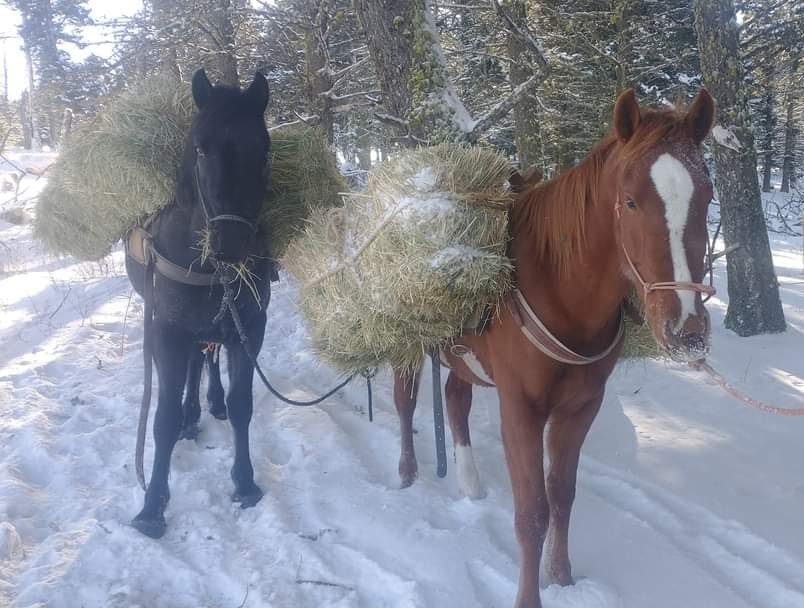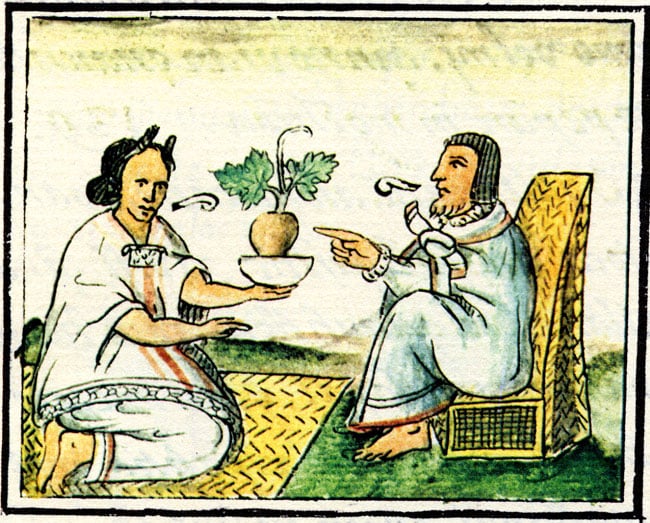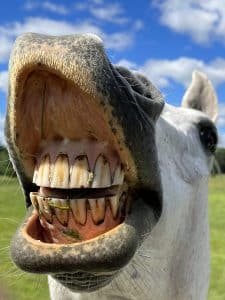
Tevis, 12, a kill pen rescue. Lucky guy!
Have you ever thought about what a horse really needs? Oh, I’m not talking about the latest in designer leg wraps, or some supplement to “support” something in some ill-defined way, or even some medical intervention that’s sure to keep things going faster, better, longer, and stronger. I’m talking about the basic needs – things that horses need for their own well-being, and not things that we feel we need to do for them.
Every animal has basic needs that are important for the animal’s well-being. If those needs aren’t met, the animal suffers. What about those of the horse?
Actually, according to research, when it comes to the fundamental things that a horse needs for its well-being, there are generally thought to be only four:
- Social Contact
- Social Companionship
- Free movement
- Access to roughage
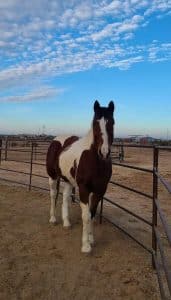
Casino, 14 year TN Walker x Draft gelding
Honestly, that’s a pretty simple list. You might think, “That’s it? It has to be more complicated than that.” Turns out that it’s not more simple than that, and there’s research to prove it.
In 2021, researchers in Germany and Scotland looked over 38 different studies that looked at what happens to horses when one or more of the four things on the list are restricted. The researchers wanted to see if horses demonstrated any abnormal behaviors when they were denied access to one or more of those four things. The results are fascinating, both in terms of what they found, as well as in implications for the way that we keep horses. You can see the study if you CLICK HERE.
SOCIAL CONTACT
I hope it isn’t some revelation to learn that horses like being with other horses. In the wild (which, by the way, is not a synonym for “good,” but it’s still useful), horses live in herds of 200 – 400 individuals. There’s been a lot of studies about the social arrangements of wild horses – with dominant males and their harems, bachelor bands, and such – but they fact is that they enjoy hanging out with other horses. The way some horses are kept may deprived them of that.
SOCIAL COMPANIONSHIP
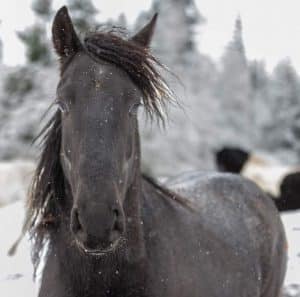
Java, 2 year old BLM mustang
In the wild, horses not only hang out with each other, they bond with each other. In fact, something like 1/3 of all horses socially bond with other horses in their group. I’m sure you’ve seen how some horses react when they are separated from their buddies – their reactions can be really annoying to us, but separation from a dear friend can be panic-inducing for some horses. Animals that bond together act just like groups of families and friends. They protect each other, they look after each other’s kids, and they even protect areas where food water, and rest can be found. They’re bros.
FREE MOVEMENT
Horses like to move. Really move. All the time. In fact, left to their own devices, they’ll move as much as 50 miles a day (80 km or so for your metric folk). They travel where the water is and where the feed is. They tend to move slowly and steadily, with occasional bursts of movement. All that moving around keeps fluid – blood, lymphatic fluid, joint fluid – moving around in the horse’s body. It’s the way things are supposed to be.
ROUGHAGE
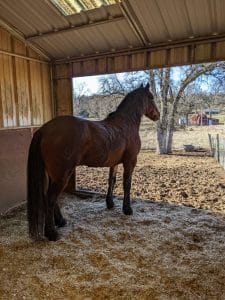
Oberyn, 11 year old Mustang (maybe)
The final basic need of a horse is said to be access to roughage (hay, grass, straw, or such). After all, in the wild, they eat all of the time, at least 12 to 16 hours daily, and, honestly, the quality of their feed – the protein, calorie content, etc. – isn’t all that high, compared to the farmed forage that many horses in captivity get. In captivity? Sometimes they get fed twice a day. Sometimes their roughage gets replaced with grain concentrates. A captive horse’s diet can be quite a ways from what they really need.
DISEASES OF CONFINEMENT
You’ve probably all heard the phrase, “As healthy as a horse,” and, what with all of the constant bombardment about all of the diseases that horses have, and all of the things that horses “need” in order to be healthy, sometimes I think that horse owners may be justified in wondering which comedian ever came up with the phrase. But, truth be told, a lot of the problems that horses have are as a direct result of us taking care of them in a manner that’s convenient for us, but not necessarily appropriate to them. In fact, that’s something that’s been studied quite a lot.
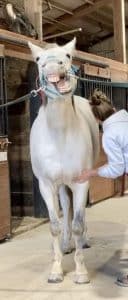
Willow, 17 year old Quarterhorse mare
For example, gastric ulcers, which, it seems, get credited for almost every problem of the horse, from refusing a jump, to resisting the command to bend, to not like having the girth tightened, to running right by (rather than around) a barrel. But many of these horses have their roughage restricted, and instead, replaced by very cleverly named and beautifully packaged feeds full of concentrated calories and very little in the way of roughage. When horses don’t get access to roughage, it can be hard on their stomachs; digestive salivary enzymes may be decreased, and the acid-neutralizing effect of feed itself is reduced. For many horses, rather than go out and buy another tube or tub of ulcer medication, maybe a little bit more hay, a little bit more often, would do the trick.
What if horses can’t move because they’re confined in a stall most of the time? Well, for one, their joints, muscles, tendons, and ligaments don’t get their normal activity. Exercise is important for everyone’s health: mental and physical. Restricting exercise not only affects the musculoskeletal system, it also messes with a horse’s head. Stress caused by restricting movement in horses can even be shown to change their brain waves (CLICK HERE if you want to try to get through a really dense study. On the other hand, horses that have previously had their movement restricted can be shown to be happier when they’re allowed to be out moving around with their friends. When a horse’s movement is restricted, they can become explosive, leading to such fun activities as barn skiing.
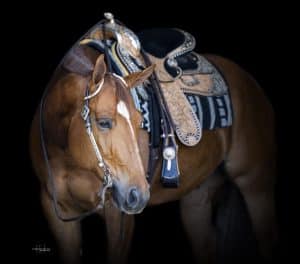
Fonzie, 9 year old Quarterhorse gelding
And there’s more. When horses have their social relationships disrupted, their behavior can be shown to change. Without normal social interactions, horses can become more aggressive, both towards other horses, and to people, too. They can also show signs associated with depression. On the other hand, when horses are kept in groups, they’re usually more trainable. They’re happier: less cranky.
COPING
How do horses cope when their basic needs aren’t met? Well, in general, not that well. If you’ve seen horses cribbing, or stall weaving, or even biting at themselves, it’s usually an indication that they’re not coping well with their environment. It is known that free ranging, wild horses, have never been shown to have “stall vices” (which is kind of an ironic name, since horses never asked to be put in a box in the first place – it’s not their fault). Maybe they don’t like the fact that they can’t move around enough in the stall, or maybe they don’t have enough contact with their neighbors: or both. They try to cope as best as they can.
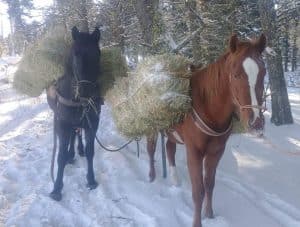
Danny & Luther (the black horse) half brothers born the same day just feet apart – July 3rd 2020.
Of course, there’s going to be individual variation in how horses respond to their situations. There may also be some adaptation, for example, horses that were born and raised in a stable may find all of the attendant restrictions on their movement, interaction, etc., to be less stressful than does a horse raised in a pasture and then moved into a stable. Add factors such as genetics, housing, and types of feed (esp., concentrates vs. forage) and trying to link behavior to outside factors may not be as easy as we’d like to think.
BOTTOM LINE?
For me, the bottom line is that many horses – like many people – don’t live in a perfect world. That said, I don’t think it’s useful to start pointing fingers and making value judgments when a horse’s situation isn’t what we want it to be. However, I do think that it’s important for everyone to recognize that the ills of horses aren’t necessarily solved by more products and services. Horse behavior and performance isn’t only about good physical health – mental health is important for horses, too. When you start restricting social contact, you replace roughage with grain concentrates, and limit their movement, you shouldn’t be surprised if some horses develop behavioral problems, or don’t want to perform. Some of them might actually be suffering from all that’s been taken away from them. At the end of the day, putting some thought into the horse’s four basic needs might make your relationship even better.

